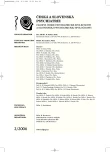-
Medical journals
- Career
Pharmacological Influence on Glutamatergic System in Schizophrenia
Authors: J. Hons
Authors‘ workplace: Psychiatrická klinika LF UK a FN, Hradec Králové přednosta prof. MUDr. J. Libiger, CSc.
Published in: Čes. a slov. Psychiat., 102, 2006, No. 2, pp. 85-90.
Category: Comprehensive Reports
Overview
Glutamatergic neurotransmission modulators have been already used in the treatment of Alzheimer’s disease and some affective disorders. Dysfunction of glutamatergic neurotransmission may be also involved in pathophysiology of schizophrenia. There is evidence of positive therapeutic effects of agonists of glycine modulatory site of NMDA receptors on symptoms of schizophrenia in clinical trials. The drugs modulating extracellular levels of NMDA receptor agonists and AMPA receptor modulators are currently under clinical evaluation. The hypothesis of glutamatergic hyperfunction proposed the effect of glutamate release-inibiting drugs in schizophrenia. Positive therapeutic effect of lamotrigine in add-on therapy has been demonstrated in patiens with schizophrenia treated with atypical antipsychotics.
Key words:
glutamate, schizophrenia, NMDA receptor agonists, glycine transport inhibitors.
Labels
Addictology Paediatric psychiatry Psychiatry
Article was published inCzech and Slovak Psychiatry

2006 Issue 2-
All articles in this issue
- Relation between Body Weight-Height and Menstruation in Patients with Anorexia Nervosa
- Hippocampal Volume Assessment in Schizophrenia – Experience from the Department of Psychiatry in Brno
- Sleep and Attention-Deficit/Hyperactivity Disorder Overview of Present-Day Information
- Pharmacological Influence on Glutamatergic System in Schizophrenia
- The Wellness Program - the Glance Back to the First Year
- Czech and Slovak Psychiatry
- Journal archive
- Current issue
- Online only
- About the journal
Most read in this issue- Sleep and Attention-Deficit/Hyperactivity Disorder Overview of Present-Day Information
- Relation between Body Weight-Height and Menstruation in Patients with Anorexia Nervosa
- Pharmacological Influence on Glutamatergic System in Schizophrenia
- The Wellness Program - the Glance Back to the First Year
Login#ADS_BOTTOM_SCRIPTS#Forgotten passwordEnter the email address that you registered with. We will send you instructions on how to set a new password.
- Career

